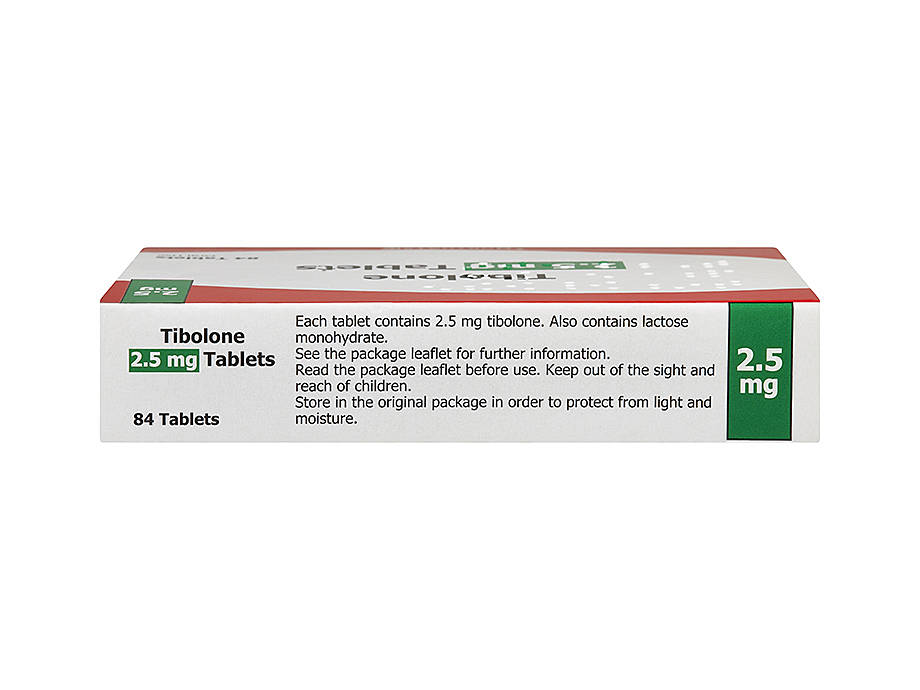Tibolone
Use tibolone tablets to prevent hot flushes and other symptoms of menopause.








Prices from £33.00
In stock. Simply fill in a brief questionnaire. One of our doctors will review your order and prescribe a suitable treatment. How to Order
-
Tibolone tablets are taken daily to prevent hot flushes and other symptoms in postmenopausal women (12 months since your last period). They are a type of Hormone Replacement Therapy (HRT) and have to be prescribed by a doctor. You may also be prescribed tibolone If you are at risk of fractures from osteoporosis after going through the menopause. The active ingredient in these tablets is tibolone.
You will find tibolone prescribed and sold both under its generic name (tibolone) and under the brand name Livial in the UK.




About Tibolone
What are tibolone tablets?
Tibolone tablets are used to prevent menopause symptoms such as hot flushes. They can only be prescribed if you had your last period over 12 months ago.
In some cases, tibolone tablets will also be prescribed to women who develop fragile bones after menopause. This is because tibolone can help prevent fractures.
How do tibolone tablets work?
Tibolone tablets work by replacing hormones in your body that are lost when you have gone through the menopause. Your body breaks down tibolone to make the female hormones oestrogen and progesterone. Having these hormones in your body will help to relieve your symptoms.
Tibolone is a form of HRT, but it is different to other types because it contains tibolone rather than the actual hormones.
-
-
You should take one 2.5mg tablet of tibolone each day.
You should:
- start with the correct day of the week at the top of the strip
- take the tablet at the same time each day
- swallow the tablet whole with water
- not take a break between strips
If you have never used HRT before, and your last period was more than 12 months ago, you can take tibolone straight away. If you start taking tibolone after using another form of HRT, your doctor will advise you on how to change to tibolone. If you forget to take your tablet at the right time, take it as soon as you remember. If you are over 12 hours late, just take your next pill at the right time. Do not take a double dose.
If you accidentally take more tibolone than prescribed, you may feel or be sick or have some vaginal bleeding and should talk to your doctor. Rest assured though, it is unlikely to cause you harm.
If you need to have surgery while you are taking tibolone, make sure you tell your surgeon. There is an increased risk of clotting so you may need to stop taking it about 4 to 6 weeks before the operation.
-
-
HRT comes in different forms (such as tablets, gels and creams) and can be used to treat specific symptoms such as hot flushes, night sweats, vaginal dryness, low mood, and a reduced sex drive.
The type of HRT your doctor will prescribe will vary depending on whether you are still getting your periods or are postmenopausal. If you have had your womb removed (hysterectomy), this will also impact what your doctor will recommend.
Vaginal oestrogen treatments are used to help with vaginal atrophy, a condition that happens during the menopause which causes vaginal dryness and discomfort. Vaginal oestrogens such as Ovestin cream, Estriol cream, Vagifem tablets, and Vagirux tablets can be used to help with this. Since the oestrogen is not absorbed into the body, this type of treatment has lower risks, but does not help with other symptoms, like hot flushes.
When the HRT is absorbed into the body, it is called systemic HRT. This comes in several different forms.
The 3 main different types of systemic HRT are:
- oestrogen-only
- combined oestrogen and progesterone (Elleste Duet Conti tablets, Evorel Conti patches, Kliovance tablets, Femoston Conti tablets, Kliofem tablets)
- tibolone (a medicine that your body breaks down to make oestrogen and progesterone)
A prescription medicine that is an alternative to HRT is Clonidine. It does not include hormones and can help to reduce hot flushes and night sweats. However, it can have unpleasant side effects such as depression, drowsiness, and constipation.
Alternative remedies such as evening primrose oil, angelica, ginseng, St John’s wort, and black cohosh are used to treat menopausal symptoms. While some of these may help with hot flushes, it is not clear from scientific evidence what are the right doses and whether the benefits will last. Some remedies such as St John’s wort can interact with other medicines with serious implications.
As well as medication or remedies, making lifestyle changes can help you to deal with the symptoms of the menopause.
These include:
- stopping smoking
- reducing your alcohol and caffeine intake, and eat less spicy food
- reducing your stress levels
- exercise regularly and eating a healthy diet
- keeping your room cool at night
- using a moisturiser or water-based lubricant to relieve vaginal dryness
-
-
You can only take tibolone if it has been 12 months since your last period. As with any medicine, some people will get side effects and these will vary from person to person.
You should see a doctor right away if you think you:
- have an increase in blood pressure
- the whites of your eyes or skin goes yellow (signs of jaundice)
- have new migraine-type headaches
- have sudden chest pain, swollen legs and difficulty breathing (signs of a blood clot)
Common (up to 1 in 10) side effects reported by women include:
- vaginal issues such as itching, secretions or spotting
- thrush
- thickening or changes to the womb or cervix
- breast pain, including painful nipples
- pain in the stomach or pelvis
- abnormal results from a smear test
- weight gain
- having an upset stomach
- acne
- fluid retention in hands, ankles and feet
Tell your doctor if you are taking any medication (including herbal supplements). The following medicines may interact with tibolone and affect how it works:
- epilepsy medicines such as phenobarbital, phenytoin and carbamazepine
- medicines for tuberculosis such as rifampicin and rifabutin
- medicines for HIV infection such as nevirapine, efavirenz, ritonavir and nelfinavir
- warfarin
- herbal remedies containing St John’s Wort
There is a slight increase in your risk of developing breast and ovarian cancers and other conditions such as blood clots and stroke from taking HRT. Your doctor can advise you on the risks and advantages of taking tibolone.
Some women report a link between taking HRT and putting on weight. There is no scientific evidence to back this up. Eating a balanced diet and taking regular exercise will help you maintain a healthy weight.
The patient information leaflet has more information on side effects, contraindications and risks of taking tibolone.
You should not take tibolone if you:
- have had a period within the last 12 months
- you are pregnant or might be pregnant
- have or have had in the past breast cancer or cancer of the womb lining
- have untreated thickening of the womb or unexplained vaginal bleeding
- have blood clots or a blood clotting disorder or disease caused by blood clots
- have or have had liver disease
- have a rare blood condition called porphyria
- are allergic to any of the ingredients

Dr Kathryn Basford is a qualified GP who works as a GP in London, as well as with ZAVA. She graduated from the University of Manchester and completed her GP training through Whipps Cross Hospital in London.
Meet our doctorsArticle created: 27 Sept 2021
Last reviewed: 27 Sept 2021
-
Different ingredients, strengths and brands available Menopausedoctor.co.uk [accessed 9th September 2021]
-
Hormone replacement therapy alternatives NHS September 2019 [accessed 9th September 2021]
-
Hormone replacement therapy risks NHS September 2019 [accessed 9th September 2021]
-
Tibolone Drugs.com [accessed 9th September 2021]
-
Tibolone NICE [accessed 9th September 2021]


GMC: 7074021

GMC: 6149061

GMC: 7085115







